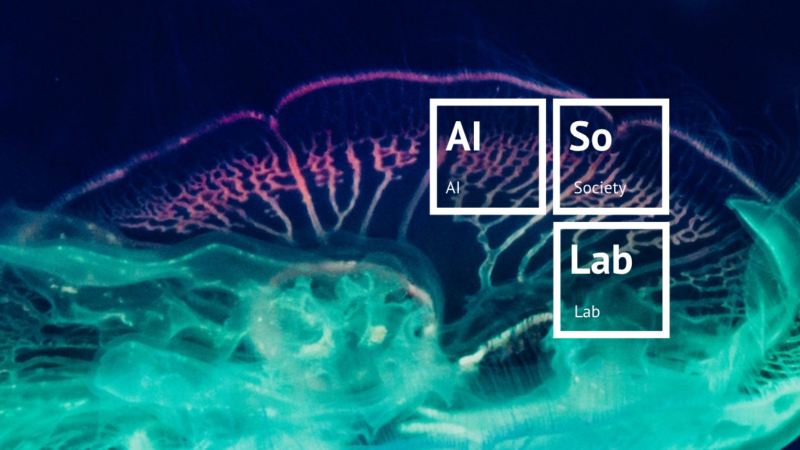
Public Interest AI
The Public Interest AI research project addresses the question of how Artificial Intelligence (AI) can be designed to serve the social good. Public Interest AI means that the development and use of AI systems is not primarily focused on profit maximisation or private interests, but rather on benefiting society as a whole. This includes initiatives that promote sustainability, strengthen social inclusion, and create open systems that allow technology to be reused.
Although the use of AI for the public interest is highlighted as a key goal in policy strategies, international guidelines and government funding, it remains unclear how this can be implemented and verified in practice. This is where our research comes in: the project investigates the principles and criteria that characterise such systems and integrates them into different networks.
The aim is to create a theoretically sound yet practically applicable concept that can serve as a guide for public interest AI. This concept can not only make a significant contribution to the discourse on AI development in Europe, but also provide practical assistance to developers in the implementation of AI systems.
Public interest AI initiatives around the globe
The project takes a global approach, examining public interest AI projects to understand how they differ across national and sectoral contexts. As there is currently limited data available on such projects, a comprehensive dataset on public interest AI has been created, providing insights into the focus and self-conception of numerous initiatives.
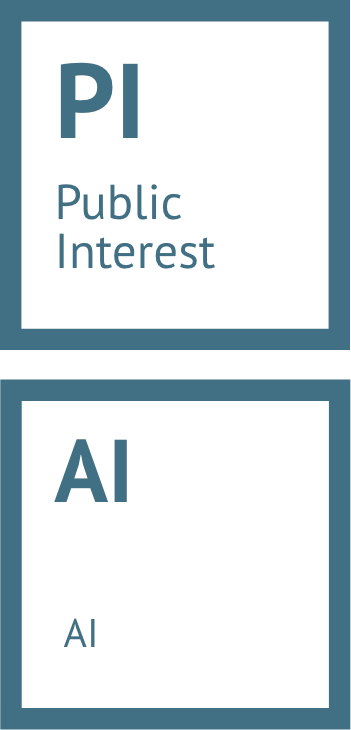 | Defining public interest AI is as challenging as it is crucial for our society. Academia and various societal stakeholders have engaged in a discourse to refine the boundaries of this concept. The Public Interest AI Interface explains the principles developed by the research group and puts them up for discussion. |
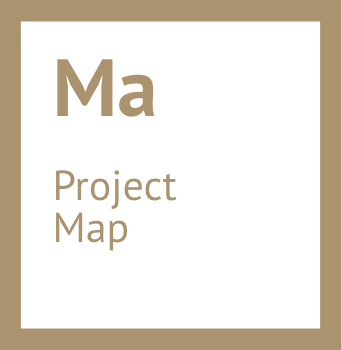 | In addition, an interactive world map provides an overview of various public interest AI initiatives. It includes detailed descriptions of their objectives, methods and frameworks. |
Doctoral projects and prototypes
The findings of the research have also been implemented in three PhD projects. The results include not only conceptual and theoretical work, but also the development of several technical prototypes that apply the developed criteria for public interest oriented AI.
 | This PhD project focuses on the automated simplification of German-language online texts. The aim is to minimise exclusion factors, e.g. for people with learning difficulties or those learning German as a foreign language, and thus to increase accessibility on the Internet. The project is working on individual components that contribute to the full automation of text simplification. This has led to the development of Simba’s AI-powered applications. These include an internet application for simplifying personal texts and a browser extension that automatically summarises text on web pages. |
 | This PhD project examines the role of fact-checking in public discourse, with a focus on how it can be enhanced through computational methods. A theoretical framework will be developed to identify claims that potentially contain disinformation. In addition, a machine-learning model will be created for the automatic classification of such claims. Furthermore, the reception and impact of fact-checks will be studied empirically in order to optimise the effectiveness of fact-checking. Based on the results and in collaboration with various newsrooms, an AI application for fact-checkers in German-speaking (and international) regions will be developed. This application will automate the search for potential disinformation and thus facilitate the workflow of fact-checkers. |
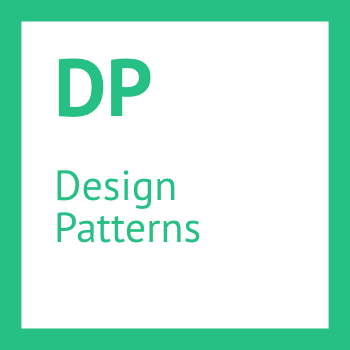 | This PhD project explores models of participatory governance in data-driven projects that form the basis of AI development. It uses the concept of design patterns, originally from architecture, which provide templates for solutions to recurring challenges. In this context, such patterns will be developed for the participatory governance of AI systems. The aim is to create a catalogue of usable patterns that can serve as a practical guide for data projects, helping to organise data access or use in a participatory way. |
Funding
| Duration | October 2020 – September 2024 |
| Funding | Federal Ministry for Education and Research | FKZ 01IS20058 |
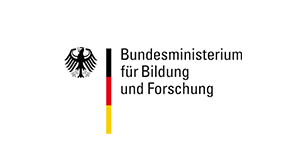

The website presents the principles of public interest AI and allows users to explore early technical prototypes that implement these criteria. An interactive world map also provides insights into different AI initiatives around the world, including their goals, methods and frameworks.
 Daniel PothmannProject Assistant: Knowledge Transfer | Human in the Loop?
Daniel PothmannProject Assistant: Knowledge Transfer | Human in the Loop?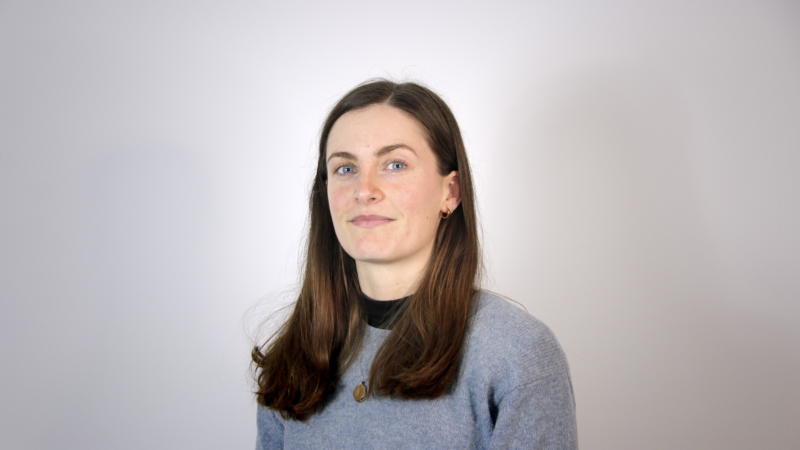 Freya HewettAssociated Researcher: AI & Society Lab
Freya HewettAssociated Researcher: AI & Society Lab Hadi Asghari, Dr.Associated Researcher: AI & Society Lab
Hadi Asghari, Dr.Associated Researcher: AI & Society Lab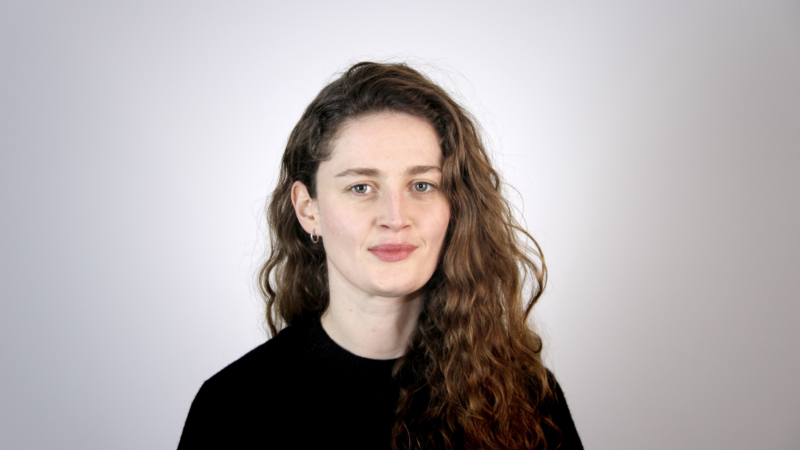 Judith FaßbenderAssociated Researcher: AI & Society Lab
Judith FaßbenderAssociated Researcher: AI & Society Lab Sami NennoAssociated Researcher: AI & Society Lab
Sami NennoAssociated Researcher: AI & Society Lab Theresa Züger, Dr.Lead AI & Society Lab, Project-Lead Impact AI
Theresa Züger, Dr.Lead AI & Society Lab, Project-Lead Impact AI
-
 Birte LübbertFormer Student Assistant: AI & Society Lab
Birte LübbertFormer Student Assistant: AI & Society Lab -
 Christopher RichterFormer Student Assistant: Public Interest AI
Christopher RichterFormer Student Assistant: Public Interest AI -
 Ferdinand Bálint DorendorfFormer Student Assistant: AI & Society Lab
Ferdinand Bálint DorendorfFormer Student Assistant: AI & Society Lab -
 Irina KühnleinFormer Student Assistant: AI & Society Lab
Irina KühnleinFormer Student Assistant: AI & Society Lab -
 Jakob Stolberg-LarsenFormer Researcher: AI & Society Lab
Jakob Stolberg-LarsenFormer Researcher: AI & Society Lab -
 Johanna Teresa WallenbornFormer associate Researcher: Public Interest AI
Johanna Teresa WallenbornFormer associate Researcher: Public Interest AI
Journal articles and conference proceedings
Nenno, S., & Puschmann, C. (2025). All The (Fake) News That’s Fit to Share? News Values in Perceived Misinformation across Twenty-Four Countries. The International Journal of Press/Politics. DOI: https://doi.org/10.1177/19401612241311893 Publication details
Nenno, S. (2025). Fact-checks as Data Source? Content Analysis of Fact-checking Articles in Germany between 2019 and 2023. Computational Communication Research, 7(1), 1. DOI: https://doi.org/10.5117/CCR2025.1.6.NENN Publication details
Nenno, S. (2024). Potentials and Limitations of Active Learning for the Reduction of Energy Consumption during Model Training. Weizenbaum Journal of the Digital Society, 4(1). DOI: 10.34669/WI.WJDS/4.1.3 Publication details
Nenno, S. (2024). Propositional claim detection: A task and dataset for the classification of claims to truth. Journal of Computational Social Science. DOI: 10.1007/s42001-024-00289-0 Publication details
Nenno, S. (2024). Is checkworthiness generalizable? Evaluating task and domain generalization of datasets for claim detection. Neural Computing & Applications, 36, 15165–15176. DOI: 10.1007/s00521-024-09896-4 Publication details
Nenno, S. (2024). Bootstrapping public entities. Domain-specific NER for public speakers. Communication Methods and Measures. DOI: 10.1080/19312458.2024.2388098 Publication details
Hewett, F., Asghari, H., Stede, M. (2024). Elaborative Simplification for German-Language Texts. Proceedings of the 25th Annual Meeting of the Special Interest Group on Discourse and Dialogue, 29-39. Publication details
Fassbender, J., & Henderson, T. (2024). Participatory to what end? Mapping motivations for participatory approaches in data-driven projects. GoodIT '24: Proceedings of the 2024 International Conference on Information Technology for Social Good, 301–305. DOI: 10.1145/3677525.3678675 Publication details
Züger, T. & Asghari, H. (2024). Introduction to the special issue on AI systems for the public interest. Internet Policy Review, 13(3). DOI: 10.14763/ 2024.3.1802 Publication details
Asghari., H., Hewett, F., & Züger, T. (2023). On the Prevalence of Leichte Sprache on the German Web. ACM WebSci ’23 Conference Proceedings, 147-152. DOI: 10.1145/3578503.3583599 Publication details
Hewett, F. (2023). APA-RST: A Text Simplification Corpus with RST Annotations. Proceedings of the 4th Workshop on Computational Approaches to Discourse (CODI 2023), 173-179. Publication details
Züger, T., Kuper, F., Fassbender, J., Katzy-Reinshagen, A., Kühnlein, I. (2023). Handling the hype: Implications of AI hype for public interest tech projects. TATuP – Journal for Technology Assessment in Theory and Practice, 32(3), 34-40. DOI: https://doi.org/10.14512/tatup.32.3.34 Publication details
Asghari, H., Stolberg-Larsen, J., & Züger, T. (2022). Approximating Accessibility of Regions from Incomplete Volunteered Data. CHI EA '22: Extended Abstracts of the 2022 CHI Conference on Human Factors in Computing Systems, 1-6. DOI: 10.1145/3491101.3519706 Publication details
Züger, T., & Asghari, H. (2022). AI for the public. How public interest theory shifts the discourse on AI. AI & Society. DOI: 10.1007/s00146-022-01480-5 Publication details
Hewett, F. & Stede, M. (2022). Extractive Summarisation for German-language Data: A Text-level Approach with Discourse Features. Proceedings of the 29th International Conference on Computational Linguistics (COLING), 756-765. Publication details
Asghari, H. & Hewett, F. (2022). HIIG at GermEval 2022: Best of Both Worlds Ensemble for Automatic Text Complexity Assessment. Proceedings of the GermEval 2022 Workshop on Text Complexity Assessment of German Text, 15–20. Publication details
Asghari, H., van Biemen, Thomas, & Warnier, Martijn (2021). Amplifying Privacy: Scaling Up Transparency Research Through Delegated Access Requests. 5th Workshop on Technology and Consumer Protection (ConPro ’21). Publication details
Mahieu, R., Asghari, H., Parsons, C., van Hoboken, J., Crete-Nishihata, M., Hilts, A., & Anstis, S. (2021). Measuring the Brussels Effect through Access Requests: Has the European General Data Protection Regulation Influenced the Data Protection Rights of Canadian Citizens? Journal of Information Policy, 11, 301-349. DOI: 10.5325/jinfopoli.11.2021.0301 Publication details
Hewett, F., & Stede, M. (2021). Automatically evaluating the conceptual complexity of German texts. Proceedings of the 17th Conference on Natural Language Processing (KONVENS 2021), 228–234. Publication details
Edited works
Ashgari, H. & Züger, T. (Eds.) (2025). Proceedings of the 2nd Workshop on Public Interest AI (PI-AI 2024). Würzburg, Germany: CEUR-WS. Publication details
Züger, T. & Asghari, H. (Eds.). (2024). AI systems for the public interest [Special issue]. Internet Policy Review, 13(3). DOI: 10.14763/2024.3.1802 Publication details
Book contributions and chapters
Asghari, H. & Züger, T. (2024). Es gibt keinen Algorithmus gegen Hass – Hate Speech Detection: Über die Chancen und Grenzen der Automatisierung im Kampf gegen Rassismus und Antisemitismus. In M. Adeoso, E. Berendsen, L. Fischer, & D. Schnabel (Eds.), Code & Vorurteil – Über künstliche Intelligenz, Rassismus und Antisemitismus, Edition Bildungsstätte Anne Frank 4 (pp. 49-60). Berlin, Germany: Verbrecher Verlag. Publication details
Züger, T. (2021). The world we think is the world we get. In T. Bazzichelli, Whistleblowing for Change. Exposing Systems of Power & Injustice. Berlin, Germany: transcript. Publication details
Working paper
Züger, T., Faßbender, J., Kuper, F., Nenno, S., Katzy-Reinshagen, A., & Kühnlein, I. (2022). Civic Coding: Grundlagen und empirische Einblicke zur Unterstützung gemeinwohlorientierter KI. Civic Coding Initiative. Publication details
Other publications
Züger, T., Asghari, H. & Lübbert, B. (2025). Public Interest AI Projects 2024, Dataset. Publication details
Nenno, S. (2024). Schädliche Informationen im Netz: Wann der Hype um Desinformation schadet. Tagesspiegel. Publication details
Züger, T. & Schönig, S. (2024). The (potential) impact of AI on the individual research process and science in general. Elephant in the Lab. Publication details
Nenno, S., Theodorakopulous, D., Lebedjew, I., Metz A. (2024). Wie nachhaltig sind KI-Systeme?, Podcast: Mission Energiewende. Publication details
Nenno, S. (2024). What’s the Content of Fact-checks and Misinformation in Germany? Elephant in the Lab. Publication details
Kühnlein, I. & Lübbert, B. (2024). Ein kleiner Teil von vielen – KI für den Umweltschutz. Digital Society Blog. Publication details
Rohde, F. & Züger, T. (2024). Interview with Friederike Rohde: The environmental impact of AI as a public interest concern. Internet Policy Review, 13 (3). Publication details
Meyer, K. & Züger, T. (2024). Interview with Katharina Meyer: On the tension between public interest and profit maximisation in public interest tech. Internet Policy Review, 13 (3). Publication details
Nenno, S. (2023). Propositional Claim Detection, (NLP Datensatz). Data File Version 1.0.0, https://doi.org/10.7802/2538. Publication details
Züger, T., & Pothmann, D. (2023). The AI Transparency Cycle. Digital society blog. Publication details
Hewett, F. & Asghari, H. (2023). Lowering the barriers: Accessible language and “Leichte Sprache” on the German Web. Digital society blog. Publication details
Kühnlein, I. (2023). Public Interest Tech: A take on the actors’ perspectives on ecological sustainability. Digital society blog. Publication details
Nenno, S. (2023). Inside Hugging Face. Digital society blog. Publication details
Nenno, S. (2023). Wie können KI-Modelle energiesparender werden? Ein Überblick über aktuelle Trends. te.ma. Publication details
Lübbert, B., & Kühnlein, I. (2023). Partizipation mit Wirkung: Einblicke in die Prozesse von Common Voice. Digital Society Blog. Publication details
Fassbender, J. (2022). Why explainable AI needs such a thing as Society. Digital society blog. Publication details
Asghari, H., Birner, N., Burchardt, A., Dicks, D., Fassbender, J., Feldhus, N., Hewett, F., Hofmann, V., Kettemann, M. C., Schulz, W., Simon, J., Stolberg-Larsen, J., & Züger, T. (2022). What to explain when explaining is difficult. An interdisciplinary primer on XAI and meaningful information in automated decision-making. HIIG Impact Publication Series. Publication details
Nenno, S., & Richter, C. (2022). Sustainable AI – How environmentally friendly is AI really? Digital society blog. Publication details
Züger, T. (2022). A lion for sustainable AI: How to support a new standard for sustainability reporting? Digital society blog. Publication details
Züger, T., Katzy-Reinshagen, A., Fassbender, J., Kuper, F., & Kühnlein, I. (2022). Civic Coding. Empirische Erkenntnisse und Empfehlungen zur Unterstützung gemeinwohlorientierter KI. HIIG Impact Publication Series. Publication details
Nenno, S. (2021). Siri’s evil sister. When the Dutch public service steals your data. Digital society blog. Publication details
Hewett, F., & Stede, M. (2021). Lexica corpus, . Publication details
Hewett, F., & Nenno, S. (2021). How to identify bias in Natural Language Processing. Digital society blog. Publication details
Nenno, S. (2021). How to find the right survey tool:problems and proposals. Elephant in the Lab. Publication details
Lectures and presentations
Public Interest AI in ActionNeurIPS: Conference on Neural Information Processing Systems (Session: Women in Machine Learning). Women in Machine Learning. Vancouver Convention Center, Vancouver, Canada: 10.12.2024 Further information
Theresa Züger
Wie verändert generative Künstliche Intelligenz den Journalismus?Medienpolitische Tagung 2024: KI, Big Tech & Co. – Was wird aus dem Journalismus?. ver.di, DGB. ver.di-Haus, Berlin, Germany: 16.10.2024 Further information
Theresa Züger
Public Interest AIDigitalia 2024 (Session: Artificial Intelligence and Public Interest – paths to equity and democracy). Online, Rio de Janeiro, Brazil: 27.09.2024
Theresa Züger
All the (fake) news that’s fit to share? News values in perceived misinformation across 24 countriesECREA 2024 Communication & social (dis)order: 10th European Communication Conference (Session: From sharing to discussing: Online media experiences). European Communication Research and Education Association (ECREA). University of Ljubljana, Ljubljana, Slovenia: 25.09.2024 Further information
Sami Nenno, Cornelius Puschmann
KI in der politischen BildungStitching Democracy. Federal Agency for Civic Education (Bundeszentrale für politische Bildung/bpb). Bundeszentrale für politische Bildung, Berlin, Germany: 25.09.2024 Further information
Theresa Züger
Elaborative Simplification for German-Language TextsSIGDIAL 2024: 25th Meeting of the Special Interest Group on Discourse and Dialogue. Kyoto University. Kyoto University, Kyoto, Japan: 18.09.2024 Further information
Freya Hewett
KI & GemeinwohlAlumnitreffen: Perspektivwechsel. Common Purpose. Berliner Institut für Medizinische Systembiologie des Max Delbrück Center (MDC-BIMSB), Berlin, Germany: 16.09.2024
Theresa Züger
AI for the public interestSummer School of Artificial Intelligence and Society 2024. Bifold. Technische Universität Berlin, Berlin, Germany: 11.09.2024 Further information
Theresa Züger
Public Interest AIDiscussion Group: AI policy. Georgia Institute of Technology. Online, Georgia, USA: 10.09.2024
Theresa Züger
Mechanistic Interpretability of Socio-Political Frames in Language Models: an ExplorationAdvances in Interpretable Machine Learning and Artificial Intelligence (AIMLAI). INRIA. Radisson Blu Vilnius Hotel, Vilnius, Lithuania: 09.09.2024 Further information
Hadi Asghari, Sami Nenno
Random Evidence. Study on the Types of Evidence used to debunk Misinformation and the Implications for Automated Fact-checkingMisdoom 2024: 6th Multidisciplinary International Symposium on Disinformation in Open Online Media. University of Münster. Münster Palace, Münster, Germany: 03.09.2024 Further information
Sami Nenno
Interfaces gemeinwohlorientierter KIVortragsreihe “Der Interface-Komplex“. Brandenburg Center for Media Studies. ZeM – Brandenburgisches Zentrum für Medienwissenschaften, Potsdam, Germany: 02.07.2024 Further information
Theresa Züger
KI gegen die Klimakrise. Was ist dran?CityLAB Sommerkonferenz 2024. CityLAB. Haus Ungarn, Berlin, Germany: 27.06.2024 Further information
Theresa Züger
Gemeinwohlorientierte KI und GerechtigkeitVernetzungstreffen der Förderinitiative „KI-Leuchttürme für Umwelt, Klima, Natur und Ressourcen“. Federal Ministry for the Environment, Nature Conservation, Nuclear Safety and Consumer Protection (BMUV). Impact Hub, Berlin, Germany: 11.06.2024 Further information
Theresa Züger
Wandel durch KI?Wikipedia-Zukunftskongress 2024. Wikimedia. Korn’s, Nürnberg, Germany: 08.06.2024 Further information
Theresa Züger
Fact-checks as Data Source? Content Analysis of Fact-checking Articles in Germany between 2019 and 2023Ringvorlesung: "Politische Kommunikation". Friedrich-Schiller-Universität Jena. Institut für Kommunikationswissenschaft, Jena, Germany: 29.05.2024 Further information
Sami Nenno
AI and the publicUrban Hosts: Conversations about urban life, digital society, and our civic environments. Urban Hosts. Bezirkszentralbibliothek Pablo Neruda, Berlin, Germany: 14.05.2024 Further information
Theresa Züger
Künstliche Intelligenz - Ein „Gamechanger” in der Entwicklungszusammenarbeit?KAAD-Jahresakademie: Künstliche Intelligenz: Interkulturelle Reflexionen aus Wissenschaft und Kirche. Katholischer Akademischer Ausländerdienst. Haus Venusberg e.V., Bonn, Germany: 26.04.2024 Further information
Theresa Züger
Public Interest AIMercator Forum: Digitale (Ohn-)Macht – Teilhabe und Zusammenhalt in der digitalisierten Gesellschaft. Stiftung Mercator. Stiftung Mercator, Essen, Germany: 24.04.2024 Further information
Theresa Züger
Komplexitätsmerkmale auf der Textebene: Eine systematische KorpusanalyseTagung: Einfach oder komplex? Befunde zur Passung geschriebener Sprache für verschiedene Zielgruppen. Institut für Deutsch als Fremdsprachenphilologie. Universität Heidelberg, Heidelberg, Germany: 22.03.2024 Further information
Freya Hewett
Implementation of Public Interest AIBARC Data Festival. BARC GmbH. Muffatwerk Munich, Munich, Germany: 19.03.2024 Further information
Sami Nenno
Implementation of Public Interest AIDATA festival #Munich: Getting real with AI. BARC. Muffatwerk Munich, Munich, Germany: 19.03.2024 Further information
Sami Nenno
What we mean by AI for public interestDATA festival #Munich: Getting real with AI. BARC. Muffatwerk Munich, Munich, Germany: 19.03.2024 Further information
Theresa Züger
KI im GemeinwohlsektorFachvortrag: "KI im Gemeinwohlsektor". Evangelischer Diakonieverein Berlin-Zehlendorf e.V.. Gäste- und Tagungshaus am Glockengarten, Berlin, Germany: 20.02.2024
Theresa Züger
AI in the Public Interest - a global perspectiveDeutsch-Kenianischer Dialogtag. Federal Ministry for Digital and Transport (BMDV), Kenyan Ministry of Information, Communication and Digital Economy (MICDE). Online, Berlin, Germany: 13.02.2024 Further information
Theresa Züger
Seminar: Digital CitizenshipDigital Citizenship. Vienna University of Economics and Business. Vienna University of Economics and Business, Vienna, Austria: 03.02.2024
Theresa Züger
The Who, How and Why of Participation in Databased Projects - A Systematic Literature ReviewBig Data Discourses: Communicating, Deliberating, and Imagining Datafication (Session: Reviewing Participatory Dimensions in Data-Centric Projects). Department for Communication and Media Studies. Leipzig University, Leipzig, Germany: 01.02.2024 Further information
Judith Faßbender
How AI can serve Public InterestsOnline Festival: Perpetual Beta 2024. Goethe-Institut. Online, Munich, Germany: 01.02.2024
Theresa Züger
KI im Sinne des GemeinwohlsKünstliche Intelligenz verbessert Gesellschaft?!. Academy for Political Education Tutzing. Academy for Political Education Tutzing, Tutzingen, Germany: 19.01.2024 Further information
Theresa Züger
Desinformation und KI. Wird jetzt alles noch schlimmer?Lecture: Desinformation und KI. Wird jetzt alles noch schlimmer?. Modus – Zentrum für angewandte Deradikalisierungsforschung gGmbH. Modus – Zentrum für angewandte Deradikalisierungsforschung, Berlin, Germany: 12.12.2023
Sami Nenno
AI und SustainabilityAI for Sustainability / Sustainable AI (Session: AI & Social Sustainability). Technische Universität München (TUM), Hochschule München. Online, Munich, Germany: 17.11.2023
Theresa Züger
KI im Sinne des Gemeinwohls#ZukunftWohlfahrt: Mit Daten & KI die Wohlfahrt von morgen gestalten. Deutsches Rotes Kreuz. Online, Dresden, Germany: 15.11.2023
Theresa Züger
The Opportunities of AI in Addressing Human Rights RisksUN GCD Annual Conference 2023 (Session: Menschenrechte & Arbeitsnormen). UN Global Compact Netzwerk Deutschland (UCD). Humboldt Carré, Berlin, Germany: 07.11.2023 Further information
Hadi Asghari
AI-systems for the public interestAoIR2023 (Session: AI-systems for the public interest). Temple University (TU), University of Pennsylvania (Penn). Sonesta Hotel, Philadelphia, USA: 18.10.2023 Further information
Theresa Züger
AoIR2023 (Session: AI-systems for the public interest). Temple University (TU), University of Pennsylvania (Penn). Sonesta Hotel, Philadelphia, USA: 18.10.2023 Further informationFreya Hewett
Workshop: Shifting AI Controversies (Session: Shifting AI Controversies: Sind die KI-Kontroversen, die wir haben, die KI-Kontroversen, die wir brauchen?). Humboldt Institut for Internet and Society. Humboldt Institut for Internet and Society, Berlin, Germany: 05.10.2023 Further informationTheresa Züger
KI 2023 – 46th German Conference on Artificial Intelligence (Session: AI Systems for the Public Interest). Gesellschaft für Informatik (GI). Hochschule für Technik und Wirtschaft Berlin, Berlin, Germany: 26.09.2023 Further informationJudith Faßbender, Freya Hewett, Sami Nenno
KI im Sinne des GemeinwohlsFachtagung Münster. Diakonie Deutschland. Online, Münster, Germany: 21.09.2023
Theresa Züger
Propositional Claim DetectionInternational Conference for Computational Social Science IC2S2'23 Copenhagen. International Society for Computational Social Science (ISCSS). Mærsk Tower of the University of Copenhagen, Copenhagen, Denmark: 20.07.2023 Further information
Sami Nenno
APA-RST: A Text Simplification Corpus with RST AnnotationsACL 23: The 61st Annual Meeting of the Association for Computational Linguistics. Association for Computational Linguistics. The Westin Harbour Castle, Toronto, Canada: 13.07.2023 Further information
Freya Hewett
AI for the Public InterestBachelor's Course: "Künstliche Intelligenz als Herausforderung der Demokratie". University of Erfurt. University of Erfurt, Erfurt, Germany: 28.06.2023
Hadi Asghari
On the Prevalence of Leichte Sprache on the German Web15th ACM Web Science Conference 2023. Association of Computing Machinery. 15th ACM Web Science Conference 2023, Evanston, USA: 30.04.2023
Hadi Asghari
Eine Bestandsaufnahme des CO2-Fußabdrucks von AI: Was wissen wir und wie können wir ihn verringern?KI Camp 2023. Gesellschaft für Informatik. Factory Berlin Görlitzer Park, Berlin, Germany: 26.04.2023 Further information
Sami Nenno, Hadi Asghari
AI for Sustainability & Sustainable AICIFE Master programmes in Global Economic Governance & Public Affairs (GEGPA) and EU Trade & Climate Diplomacy (EUDIPLO). Centre International de Formation Européenne (CIFE). Centre International de Formation Européenne (CIFE), Berlin, Germany: 17.03.2023
Asghari, H., Nenno, S.
Public Interest AIFeministische Digitalpolitik (Session: Public Interest AI). Superrr Lab. Superrr Lab, Berlin, Germany: 20.02.2023
Theresa Züger
Demystifying AI: Typologies to map AI-systems and datasetsLehrauftrag. KISD - Köln International School of Design. KISD - Köln International School of Design, Cologne, Germany: 18.11.2022
Judith Fassbender
Public Interest AIUNESCO Fachausschuss Kommunikation und Information. German Comission for UNESCO. UNESCO Fachausschuss Kommunikation und Information, Brussels, Belgium: 15.11.2022 Further information
Theresa Züger
Was bedeutet Transparenz für KI-Systeme?ZVKI Fachforum. iRights.Lab. Online, Berlin, Germany: 10.11.2022 Further information
Theresa Züger
Digital tools for text simplificationSeminar “Sprache als Schwelle zur Kunst? Kunstvermittlung und Konzepte einfacher und leichter Sprache”. Kunsthalle Osnabrück. Online, Osnabrück, Germany: 09.11.2022
Freya Hewett
Civic Coding – KI für das Gemeinwohl nutzenCivic Coding – KI für das Gemeinwohl nutzen. Bundesministerium für Arbeit und Soziales. Impact HUB Berlin, Berlin, Germany: 18.10.2022 Further information
Theresa Züger, Judith Fassbender, Freia Kuper
Design Patterns – Prozessformate für eine verantwortungsvolle Umsetzung von KI-SystemenKI-Lab. The Policy Lab Digital, Work & Society of the Federal Ministry of Labour and Social Affairs. KI-Lab of the Policy Lab Digital, Work & Society of the Federal Ministry of Labour and Social Affairs, Berlin, Germany: 30.09.2022
Judith Fassbender
Poster Pitch: Are AI standardisation processes inclusive enough to deliver tech that works for everyone?European Think Tank Conference 2022. German Council on Foreign Relations (DGAP). European Think Tank Conference 2022, Berlin, Germany: 20.09.2022 Further information
Hadi Asghari
Approximating Accessibility of Regions from Incomplete Volunteered DataCHI EA '22. Association of Computing Machinery. Online, New Orleans, USA: 03.05.2022 Further information
Hadi Asghari
Seminar: Programmatische Autonomie: Künstliche Intelligenz und selbstfahrende Autos (Session: Lecture: Künstliche Intelligenz?). University of Potsdam: Prof. Dr. Jan Distelmeyer. Potsdam University, Potsdam, Germany: 03.05.2022Theresa Züger
PhD Workshop on Artificial Intelligence and Machine Learning research and DemocracyPhD Workshop on Artificial Intelligence and Machine Learning research and Democracy. University of Tübingen. University of Tübingen, Tübingen, Germany: 02.04.2022 Further information
Judith Fassbender
Particles of a whole: design patterns for transparent and auditable AI-systemsUbiComp '21: The 2021 ACM International Joint Conference on Pervasive and Ubiquitous Computing (Session: Particles of a whole: design patterns for transparent and auditable AI-systems). UbiComp. Online, New York, USA: 25.09.2021 Further information
Judith Faßbender
Automatically evaluating the conceptual complexity of German textsKONVENS 2021 (Session: Automatically evaluating the conceptual complexity of German texts). German Society for Computational Linguistics and Language Technology, the Special Interest Group on Computational Linguistics of the German Linguistic Society and the Austrian Society for Artificial Intelligence. Heinrich-Heine-Universität Düsseldorf, Düsseldorf, Germany: 09.09.2021 Further information
Freya Hewett
AI with Volunteering CommunitiesThe 3rd Workshop on Artificial Intelligence for Social Good (Session: AI with Volunteering Communities). International Joint Conferences on Artificial Intelligence, Montreal, Canada: 21.08.2021 Further information
Stolberg-Larsen, J.
Amplifying Privacy: Scaling Up Transparency Research Through Delegated Access Requests5th Workshop on Technology and Consumer Protection (ConPro ’21) (Session: Amplifying Privacy: Scaling Up Transparency Research Through Delegated Access Requests). ConPro ’21. Online, San Francisco, USA: 27.05.2021 Further information
Hadi Asghari
AI in the public interest: What does this mean and how can be build it?Gesellschaft für Informatik: #KICamp21. Gesellschaft für Informatik e.V.. Online, Berlin, Germany: 24.02.2021 Further information
Theresa Züger, Hadi Asghari, Freya Hewett, Judith Fassbender, Jakob Stolberg-Larsen
Panels
Fool Me Twice, Shame On Me: Aggregated Behavior and Clustering of Harmful Actors in Climate Change Online DiscoursesMISDOOM 2024: 6th Multidisciplinary International Symposium on Disinformation in Open Online Media. University of Münster. Münster Palace, Münster, Germany: 03.09.2024 Further information
Philip Kessling, Felix Victor Münch, Mattes Ruckdeschel, Gregor Wiedemann, Sami Nenno, Cornelius Puschmann
LLMs and the Patterns of Human Language UseLLMs and the Patterns of Human Language Use. DenkWerkstatt Berlin. Weizenbaum Institut, Berlin, Germany: 30.08.2024 Further information
Hadi Asghari
Datafied Publics: Organising participation in data-based projectsEASST/4S 2024: Making and Doing Transformations. European Association for the Study of Science and Technology and the Society for Social Studies of Science. Vrije Universiteit Amsterdam, Amsterdam, Netherlands: 18.07.2024 Further information
Judith Fassbender, Tristan Henderson
Zwischen Macht und Ohnmacht: Wie bringt Deutschland Generative KI in die Anwendung?Parlamentarischer Abend zur Generativen KI. Frauenhofer-Gesellschaft. Fraunhofer-Forum Berlin, Berlin, Germany: 13.05.2024 Further information
Theresa Züger
Artificial Intelligence and the Global South: Opportunities and ChallengesKAAD-Jahresakademie: Künstliche Intelligenz: Interkulturelle Reflexionen aus Wissenschaft und Kirche. Katholischer Akademischer Ausländerdienst. Haus Venusberg e.V., Bonn, Germany: 26.04.2024 Further information
Theresa Züger
Mit Menschenrechten Brücken bauen – Politische Bildung in TransformationsprozessenMit Menschenrechten Brücken bauen – Politische Bildung in Transformationsprozessen. Deutsches Institut für Menschenrechte. Online, Berlin, Germany: 29.02.2024 Further information
Theresa Züger
Just Institutions for AI GovernanceDigital Delhi Conclave 2024 "Reforming Institutions Through Innovation". Indraprastha Institute of Information Technology Delhi (IIIT-Delhi). Online, New Delhi, India: 16.02.2024 Further information
Theresa Züger
Teilhabe für alle? Digitalität und GemeinwohlFuture Talk 3 "Teilhabe für alle? Digitalität und Gemeinwohl". Institut für Kulturpolitik. Online, Bonn, Germany: 14.02.2024
Theresa Züger
Zukunft der Mobilität: Wenn Algorithmen unsere Wege beeinflussen125 Jahre HSG: Kompass für die Zukunft. Universität St. Gallen. Universität St. Gallen, St. Gallen, Switzerland: 30.11.2023 Further information
Theresa Züger
Digitalpolitik für alle: Lunch Talk zum GemeinwohlPodiumsdiskussion: "Digitalpolitik für alle: Lunch Talk zum Gemeinwohl". Heinrich-Böll-Stiftung - Bundesstiftung Berlin. Heinrich-Böll-Stiftung, Berlin, Germany: 08.11.2023 Further information
Theresa Züger
Strengthening Civic Engagement and DemocracyI2SC Kick Off Event. Interdisciplinary Institute for Societal Computing (I2SC). Saarland University, Saarbrücken, Germany: 07.09.2023 Further information
Theresa Züger
KI & KulturerbedigiS-Jubiläumsjahreskonferenz 2023. Forschungs- und Kompetenzzentrum Digitalisierung Berlin. Zuse-Institut Berlin, Berlin, Germany: 24.05.2023 Further information
Judith Faßbender
Wie als Gesellschaft die Kontrolle über KI behalten? Ansätze aus der aktuellen ForschungKIDD @ work. KIDD – KI im Dienste der Diversität. Ludwig-Erhard-Haus, Berlin, Germany: 31.03.2023 Further information
Theresa Züger
Künstliche Intelligenz + Gemeinwohl = ?Die dima und du! Dein Zukunftsassistent lädt ... ein!. Projektmitarbeiterin der Digitalen Manufaktur (dima) Stadt Aschaffenburg. JUKUZ - Jugendkulturzentrum Aschaffenburg, Aschaffenburg, Germany: 28.10.2022 Further information
Theresa Züger
The Future of War: Drone Surveillance, Killer Robots & Lethal AI WeaponsDNL26: The Kill Cloud: Networked Warfare, Drone & AI. Disruption Network Lab. Kunstquartier Bethanien, Berlin, Germany: 25.03.2022 Further information
Theresa Züger
Wie vermitteln wir Wissen über KI an die Bevölkerung?Auftaktveranstaltung: Zentrum für vertrauenswürdige Künstliche Intelligenz. iRights.Lab, Berlin, Germany: 07.12.2021 Further information
Theresa Züger
Young activists & human rights in a digital ageFundamental Rights Forum. Online, Fundamental Rights Forum, Warsaw, Poland: 11.10.2021 Further information
Theresa Züger
Gemeinwohlorientiert = Gemeinnützig? Unternehmen und gemeinwohlorientierte KIre:publica 21. Im Internet, Berlin, Germany: 21.05.2021 Further information
Theresa Züger
Moderation of workshops and panels
KI gegen den Klimawandel. Real oder Hype?re:publica 24. republica GmbH. STATION Berlin, Berlin, Germany: 29.05.2024 Further information
Theresa Züger
Impuls und Diskussion: „Gemeinwohlorientierte KI“Desinformation, Fake News und Co. – Meinungs- und Demokratiebildung im Schulkontext. Vodafone Stiftung, Hertie School Executive Education. Hertie School, Berlin, Germany: 17.05.2024 Further information
Theresa Züger
Impuls: Chancen und Gefahren von KI in Bezug auf DesinformationDesinformation, Fake News und Co. – Meinungs- und Demokratiebildung im Schulkontext. Vodafone Stiftung, Hertie School Executive Education. Hertie School, Berlin, Germany: 17.05.2024 Further information
Sami Nenno
Was sind Desinformationsnarrative in Deutschland und wie geht man dagegen vor?Mit Menschenrechten Brücken bauen – Politische Bildung in Transformationsprozessen. Deutsches Institut für Menschenrechte. Online, Berlin, Germany: 29.02.2024 Further information
Sami Nenno
AI-systems for the public interestAoIR2023. Temple University (TU), University of Pennsylvania (Penn). Sonesta Hotel, Philadelphia, USA: 18.10.2023 Further information
Judith Faßbender
AI Systems for the Public InterestKI 2023 – 46th German Conference on Artificial Intelligence. Gesellschaft für Informatik (GI). Hochschule für Technik und Wirtschaft Berlin, Berlin, Germany: 26.09.2023 Further information
Theresa Züger, Hadi Asghari
Automatisation and autonomyInfrastructures of Autonomy. Humboldt Institute for Internet and Society, Brandenburg Center for Media Studies. Humboldt Institute for Internet and Society, Berlin, Germany: 24.11.2022 Further information
Hadi Asghari
Organisation of events
2nd Workshop on ‘Public Interest AI’23.09.2024. Julius-Maximilians Universität Würzburg, Würzburg, Germany. Co-Organised by: 47th German Conference on AI (KI 2024) (International) Further information
Hadi Asghari, Theresa Züger
AI-systems for the public interestAoIR 2023: AI-systems for the public interest. 18.10.2023. Sonesta Hotel, Philadelphia, USA (International) Further information
Hadi Asghari, Freya Hewett, Judith Faßbender, Theresa Züger
Shifting AI Controversies: Sind die KI-Kontroversen, die wir haben, die KI-Kontroversen, die wir brauchen?Workshop: Shifting AI Controversies. 05.10.2023. Humboldt Institut für Internet und Gesellschaft, Berlin, Germany. Co-Organised by: Zentrum für Medien-, Kommunikations- und Informationsforschung (ZeMKI, Universität Bremen) (National) Further information
Freya Hewett, Judith Faßbender, Theresa Züger
Data Care - Who is cleaning, sorting and maintaining data?re:publica 2023. with attending Vip: Roos Hopman, Franziska Peter, Nora Sagel, Freia Kuper. 07.06.2023. re:publica 2023, Berlin, Germany (International) Further information
Judith Faßbender
Sustainable AI IIwith attending Vip: Lynn Kaack. 14.06.2022. Humboldt Institute for Internet and Society, Berlin, Germany (National)
Sami Nenno, Theresa Züger
AI and the Public Interest13.06.2022. Humboldt Institute for Internet and Society, Berlin, Germany (International) Further information
Hadi Asghari, Sami Nenno, Freya Hewett, Judith Faßbender, Theresa Züger
AI & Society Lab (AI & Society Lab)Study week of the ZHAW: "Der Mensch im digitalen Zeitalter". 05.05.2022. Humboldt Institute for Internet and Society, Berlin, Germany. Co-Organised by: ZHAW (International)
Sami Nenno, Judith Faßbender, Theresa Züger
Sustainable AIwith attending Vip: Friederike Rohde. 29.04.2022. Humboldt Institute for Internet and Society, Berlin, Germany (National)
Sami Nenno, Theresa Züger
Open Talk with Alex C. Engler: Algorithmic Services in the German GovernmentOpen Talk. with attending Vip: Alex C. Engler. 01.04.2022. online, Berlin, Germany (International) Further information
Open Talk with Anna Mätzener: Automatic Decision Making Systems
Open Talk Series. with attending Vip: Anna Mätzener. 20.03.2022. online, Berlin, Germany (International) Further information
Open Talk with Dr. Stephan Dreyer: Public Service media & Public Value
Open Talk Series. with attending Vip: Dr. Stephan Dreyer. 11.03.2022. online, Berlin, Germany (International) Further information
Open Talk with Julia Gundlach: Algorithms for the common good
Open Talk Series. with attending Vip: Julia Gundlach. 10.02.2022. online, Berlin, Germany (International) Further information
Research Clinic: Explainable AI
From 08.09.2021 to 12.09.2021. Humboldt Institute for Internet and Society, Berlin, Germany (National) Further information
Digitaler Salon: KI – Die Letzte räumt das Internet auf
31.03.2021. Livestream, Berlin, Deutschland (National) Further information
Natasha Vukajlovic, Philip Meier, Christian Grauvogel
Nominations
Ethics Board: MI4People.Theresa Züger
Jury Member of the Deep Tech Award.Theresa Züger
Research Clinic Europe – Platform://Democracy.Theresa Züger
Think Tank School of the German Council on Foreign Relations.Hadi Asghari, Theresa Züger

